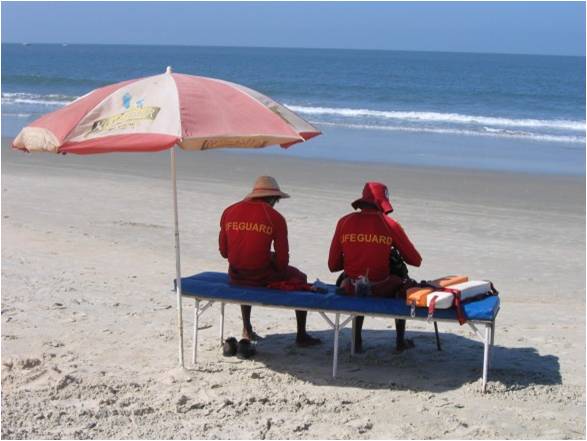Goa lies on the south-western coast of India and is renowned for its idyllic beaches and cool, laid-back spirit which has been described as an enchanting blend of the Portuguese carefree ‘sassegarde’ and the dreamy influence of the psychedelic hippies who flocked to these shores in the sixties. The truth is inevitably far more complicated and social and religious tensions are never far away but one cannot help noticing that people smile a lot around here and the smiling is infectious. The sunshine, the sea-breezes, the waves breaking down upon you, even the sleepy life-guards in fetching yellow and orange outfits are smiling…
We first came to Goa many years ago and took the time to travel around until we found a village where we felt at home and a guest-house to our liking, taking advice from fellow travellers. Many tourists choose the package holiday or the secluded five-star hotel with guards at the entrance but an increasing number prefer renting a room in guest-houses which are mostly to be found in the heart of the village. One must be prepared to be immersed in Goan life: early morning cockerels; a small boy giggling whilst washing his plate under the outside tap; a family of comical pigs grunting in the undergrowth; kites, eagles and egrets and all the dust, smoke and odour that rural India can offer. A far cry from the sanitised five-star hotel but full of charm nevertheless. Since then we have returned almost every year and found good friends within the village, but sadly change is in the air for our beloved home from home.
The Portuguese explorer Alfonso Albuquerque captured the state of Goa in 1510, using it as a doorway for an expanding trade empire. However, in 1961, after extensive negotiations had failed to get anywhere, the Indian Prime Minister Jawaharial Nehru ordered tank divisions into the state to encourage the Portuguese to relinquish their hold on this sun-drenched part of the world. Since then, the naval airport has been modernized and the red carpet literally rolled out to welcome the multitude of visitors each year who make up the increasingly valuable milk cow of the tourist industry.
A four-hundred-room apartment complex has been built to the south of the village and rumours abound that the Russian mafia have laundered their ill-gotten gains into the project. The pastel yellow apartments stand ready to be lived in and guards monitor the gated entrance. However, the locals have lodged an injunction, rightly claiming that the fragile infrastructure of the village will not support the complex and that the increased demand on electricity, water, sewerage and transport will devastate the village. Alfredo, a local hotelier, assures me though that money and corruption will make sure that the complex goes ahead.


Sangita is tweaking my toes! She roams the beach selling cheap Guajarati cloth and Rajasthani jewellery. Just nineteen years old, she is already the mother of two children whom she is trying to educate at the local school. She spends the winter months in her home village in Karnataka, earning some fifty pence a day picking peanuts. She comes to Goa during the tourist months, tempted by the chance of making money. It’s not an easy job. The police constantly hassle her and demand a daily tax or else they confiscate her wares. Whilst holiday-makers snooze under the shade of their beach parasols, Sangita trudges the sand under the heat of the day looking for custom. She could grace any European cat-walk but her beauty is transient, the rough sun tears at her face and soon she will be haggard. I’ve told her a million times that I never buy anything but she gently persists. Eventually I buy another lungi. I’ll never ever wear it and I’ve paid well over the odds but we can all afford to be foolish sometimes.
We spend our last evening at one of the restaurant shacks that are temporarily constructed on the beach every year. Armando the waiter brings us sea-bass, perfectly cooked, and we finish off with a honeybees brandy. With the waves lapping at the shore just a few feet away, the moon rising above the palm trees, just for the moment this could be paradise itself.